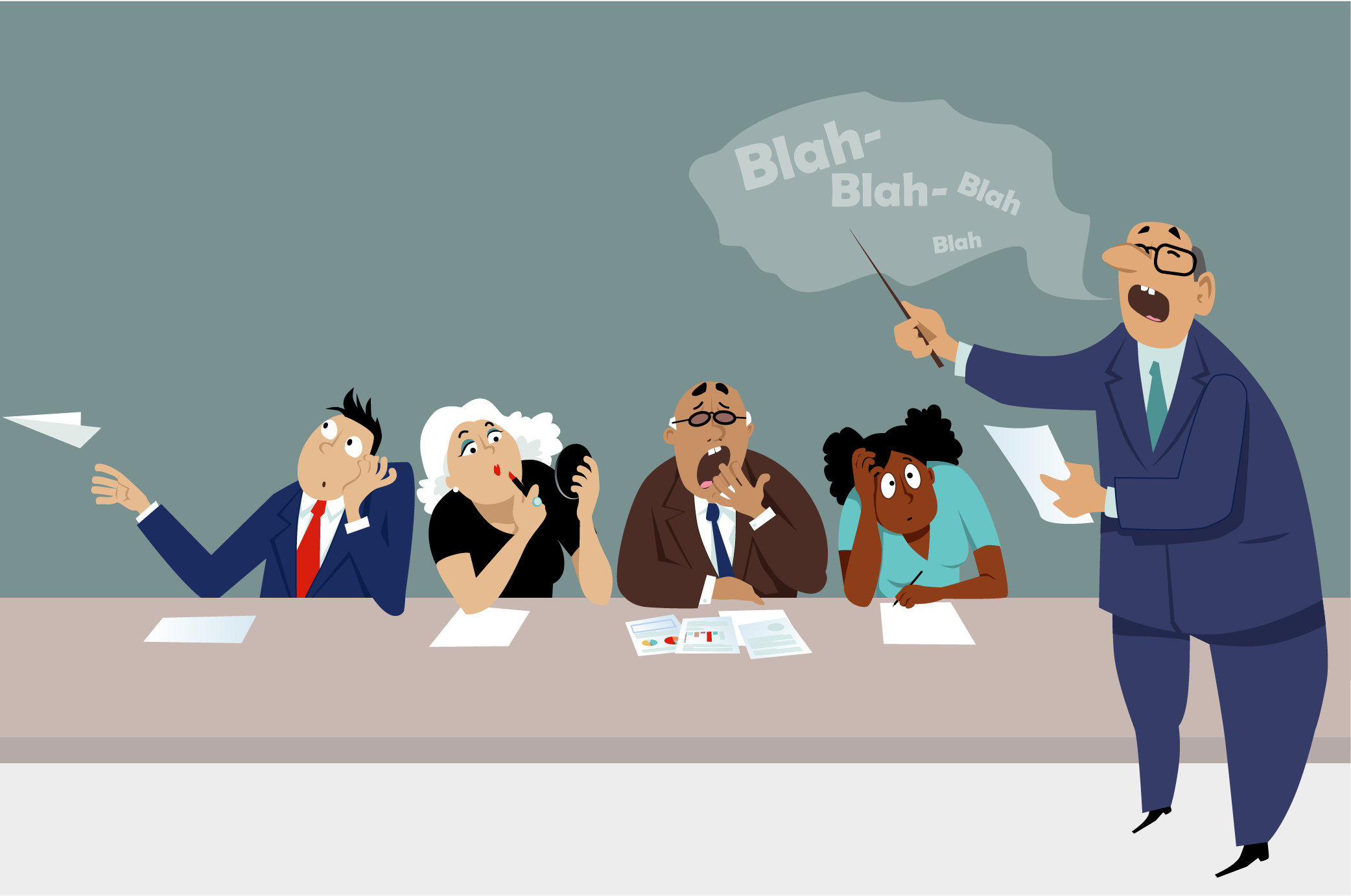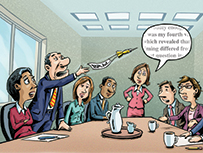

Most of us are familiar with the term “overthinking” and its negative consequences, and one of its most detrimental consequences is over “speaking”—when a messy collection of impulsive thoughts and concerns becomes tangential ruminations, under-conceived suggestions, unnecessary cautions, and unlikely hypotheticals.
We’ve all experienced these overspeakers in the workplace, whether it’s executives who can’t help but share everything on their minds, individuals who tend to overthink catastrophic scenarios, or colleagues who believe 60 seconds left in a meeting is an appropriate time to ask a three-part question.
Reasons for Overspeaking
Why do some people overspeak? Contrary to what you might think, it’s not just to hear themselves talk. Some of the reasons overspeakers go overboard:
- They’re holding out for a perfect resolution, due to a preconception that perfection, not progress, is the goal.
- They’re overfocused on unlikely adverse events, like an off-the-topic question, a freak weather occurrence, or an atypically hostile audience.
- They’re terrified of making a wrong judgment, so they postpone it through extended conversation.
- They over-rely on time-consuming analysis rather than acting decisively based on intuition, previous experience, or prior knowledge.
- They over-prioritize personal transparency, revealing much more than is needed to advance a project.
- They advocate for an opposing argument or unlikely consequence to provoke debate, erroneously believing that playing “devil’s advocate” is a mandatory step in decision-making.
How can you tell if you or someone else is overspeaking? It’s often prefaced by a familiar qualifier such as:
- “I may be overthinking, but …”
- “This probably won’t happen, but …”
- “It goes without saying that …”
- “I know we’re out of time, but …”
The Perils of Speaking Too Much
Overspeaking is sometimes excused or justified as wise caution. But while caution is wise, overthinking and overcommunicating concerns can stall progress, decrease productivity, and inhibit creativity.
Just as overthinking things can have negative consequences, so too can overspeaking.
“When individuals—or entire teams—habitually overthink, it creates a bottleneck. Decision-making slows, opportunities are missed, and a culture of risk-aversion can take hold, stifling business growth,” writes executive coach and author Melody Wilding in a Harvard Business Review article on overthinking.
“While [overanalyzing] can sometimes lead to profound insights, more often than not, it results in getting bogged down in details that might not be particularly relevant.”
Avoiding Overspeak as a Speaker
Curbing overspeaking and its paralyzing effects requires catching yourself overthinking. Amy Morin, author of 13 Things Mentally Strong People Don’t Do, suggests habitual overthinkers differentiate rumination and problem-solving.
“Replaying conversations in your head or imagining catastrophic outcomes over and over again isn’t helpful. But solving a problem is,” Morin writes in Psychology Today. “Ask yourself whether your thinking is productive.”
Productive thinking and contributions are often solution-oriented, timely, relevant to the discussion at hand, and stick to likely scenarios versus hypothetical ones.
It’s also helpful to recognize the difference between a concern and a curiosity. A concern typically involves a serious consequence, but a curiosity only involves a theoretical effect. Have you ever heard someone start a thought with “Just curious …” that turned out to be urgent or even necessary?
"While [overanalyzing] can sometimes lead to profound insights, more often than not, it results in getting bogged down in details that might not be particularly relevant."
—MELODY WILDINGCurbing Overspeak as a Leader
Leaders—of projects or companies—have a special obligation to curb overspeaking in their teams because they have the authority and responsibility to decide when discussion-time stops and decision-time starts. They should manage input and feedback with the goal of making informed decisions, not necessarily perfect ones.
“It’s important to get everybody’s input, but it’s more important to have the courage to pick a winning idea instead of simply mashing everything together,” says Ben Guttmann, marketing specialist and author of Simply Put: Why Clear Messages Win–and How to Design Them.
This advice doesn’t mean the leader has to take over every time a conversation takes a detour or gets lost in the weeds. Gentle ways to steer a meeting group away from overspeaking include establishing a “rabbit hole minder” at large meetings, encouraging consideration for other potential contributors, and ensuring meeting agendas are realistically filled based on the time allotted.

Listen to The Toastmasters Podcast for practical strategies to combat overspeaking in the workplace.
Keep Large Meetings Moving
Large meetings are an especially fertile ground for overspeaking. Applying Parkinson’s Law, which states that work expands to fill the available time, overspeaking will cause discussions to take over the meeting time—whether that dialogue is beneficial or not. What should be a short 20-minute meeting can easily take an hour or more if oversharing is welcomed and allowed.
If you find yourself—or someone on your team—taking too much meeting time discussing issues and too little time determining courses of action, limit or specify the request in those interactions. For example:
- Have attendees vote on pre-determined ideas or ask for agreement on specific concepts throughout a meeting versus asking for broad, open-ended commentary.
- Schedule a reasonable time period for discussion and encourage participants to stick to it.
- Seek diverse perspectives but avoid waiting for everyone to agree.
- Don’t be afraid to table or reschedule topics for a future time if the discussion begins to jeopardize a meeting’s purpose.
- If you’re a decision-maker, don’t hesitate to say, “Thank you so much. I have all the information and insight we need to make this decision.”
- Try to consolidate, triage, or narrow down the number of choices under consideration.
“Meetings and discussions without communication guardrails can get suffocated by the weight and outsized expectations of endless possibility,” says Guttmann. “More often than not, limiting the time allocated to developing ideas and making decisions will yield a net benefit.”
Admittedly, the lines between speaking and overspeaking, caution and excessive worry, and even curiosity and concern can be fuzzy, but that’s okay as long as the intention to sustain progress is understood and shared.
“It’s important to remember that the goal is not to eliminate all deep thinking, but rather to prevent it from spiraling into the unproductive kind,” writes Wilding.
Using the right mindset and tactics to drive relevant discussion versus unnecessary overspeaking, you can successfully move your meetings—and efforts—from paralysis to productivity.
Joel Schwartzberg is a presentation coach, executive communication specialist, and author of The Language of Leadership: How to Engage and Inspire Your Team and Get to the Point! Sharpen, Simplify, and Sell Your Message. Follow him on LinkedIn.
Related Articles

Communication
9 Surprising Ways You Can Benefit From a Pause

Communication
TMS Syndrome

Club Experience



 Previous
Previous


 Previous Article
Previous Article